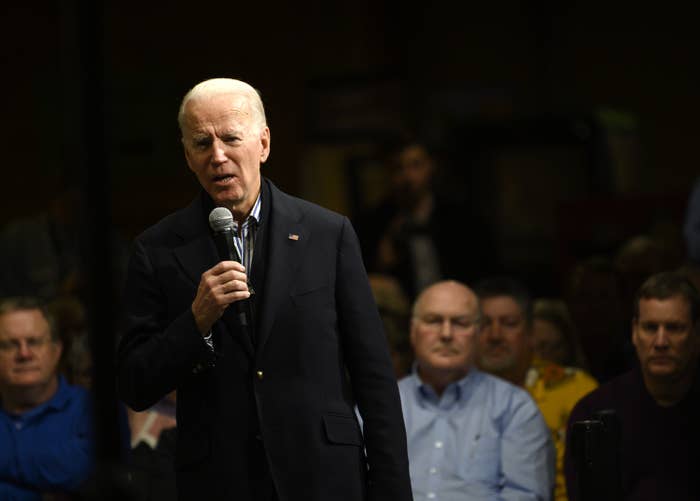
Joe Biden is repeatedly leaning into his own experience as vice president to criticize President Donald Trump’s decision to kill Iran’s Qassem Soleimani. In the process, he’s engaging in a new conflict with Sen. Bernie Sanders, who is highlighting his own anti-war stance in contrast to Biden’s record.
The Democratic presidential field, to varying degrees, has attacked Trump’s decision to approve a drone strike last week against the Iranian official in Iraq, which candidates say could destabilize the Middle East and push the United States into war. But that message is becoming central to Biden’s leading campaign — and to Sanders’ criticisms of the former vice president — as he works to keep and add support with less than a month until the Iowa caucuses.
In a statement in New York on Tuesday, Biden told reporters that Trump had made the United States an “international outlier” and that the president had planted “the seeds of these dangers” when he backed out of the Iran nuclear deal and “decided it was more important to him to destroy any progress made by the Obama-Biden administration.”
“There’s a smart way to counter Iran and a self-defeating way. Trump’s approach, in my opinion, is demonstrably the latter,” Biden said during the press statement. “Soleimani is responsible for the deaths of hundreds of American troops and thousands of innocent lives throughout the region. He was the mastermind but he was not the whole regime or its capacity to strike back. So the question is was the reward of removing a bad actor worth the risk of what comes next?”
In a fundraising email to supporters soon after the press event, Biden's campaign said the US "could be on the brink of war, and Trump’s impulsive decision may well do more to strengthen Iran’s position in the region than any of Soleimani’s plots could have ever accomplished."
Biden has also been speaking at length about Iran during recent fundraising events, seeing the primary’s pivot to foreign policy as a place of strength.
“No president can take the nation to war without the consent of the American people. Whether or not this ends up in war remains to be seen,” Biden told the audience at a private fundraiser in Manhattan on Monday night. “It’s becoming frighteningly close to getting this engaged in a war in the region.”
Over the past month, Biden has highlighted his experience and has contrasted himself against Trump’s approach to international relations. Biden released an ad in early December which centered around a viral video of world leaders including Canadian Prime Minister Justin Trudeau, British Prime Minister Boris Johnson, and French President Emanuel Macron seemingly making fun of Trump during a NATO summit.
During the Monday night fundraiser in Manhattan, Biden pushed further on that contrast in relation to the situation developing in Iran. “In the process of this whole episode going on right now, we have alienated our allies,” Biden told the audience. “It’s the first time I’m aware of that all of our NATO allies are making the moral equivalence between us and Iran. No one’s saying ‘we’re with the United States of America.’”
Sanders, who is neck-and-neck with Biden in recent early state polls, has spent the days after the strike highlighting his anti-war stance while criticizing both Biden and Trump.
“Joe Biden voted and helped lead the effort for the war in Iraq. The most dangerous foreign policy blunder in the modern history in this country,” Sanders said on Anderson Cooper 360 on Monday night.
During a speech at a campaign event in Iowa following the attack, Sanders spoke about his 2002 opposition to the Iraq War when he was in the House of Representatives, and he said that the country was heading in a similar direction now.
“When I voted against the war in Iraq in 2002, I feared that it would result in greater destabilization in that country and in the entire region. At that time I warned about the deadly so-called unintended consequences of a unilateral invasion,” Sanders said.
Biden voted in favor of the 2002 resolution in the Senate.
Biden, after predicting at a Tuesday morning fundraiser that “things [are] about to get pretty rocky,” said at the press event that Americans don’t want a president that “demands obedience” and reminded reporters of his years of service as vice president and in the Senate.
“I understand better than anyone that the system will not hold unless we find ways to work together to advance our national interests — not the political interests of one person or one party,” Biden added.
Sanders, in his speech after the attack, had a similar warning about the future. And, like Biden, he used his past to argue why his words should carry weight.
“It gives me no pleasure to tell you that at this moment we face a similar crossroads, fraught with danger. Once again we must worry about unintended consequences, and the impact of unilateral decision-making,” Sanders said. “Let me repeat a warning I gave in 2002, during the debate over the war in Iraq, quote, this is what I said back then: War must be the last recourse in our international relations.”
